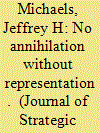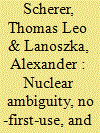| Srl | Item |
| 1 |
ID:
193176


|
|
|
|
|
| Summary/Abstract |
Scholars focused on NATO nuclear strategy during the Cold War have devoted little attention to the dynamics of how the Alliance would decide to use nuclear weapons. This article aims to fill this gap by examining the internal debates about how a nuclear use decision would be taken, particularly balancing the desire to ensure adequate consultation of the non-nuclear members without undermining the credibility of NATO’s nuclear deterrent by giving them a veto. To avoid undermining Alliance cohesion, the nuclear use decision process was kept deliberately vague, despite the problems that would almost certainly have arisen in a war.
|
|
|
|
|
|
|
|
|
|
|
|
|
|
|
|
| 2 |
ID:
157826


|
|
|
|
|
| Summary/Abstract |
The United States has long embraced calculated ambiguity over the conditions under which it might use nuclear weapons against adversaries, a trend that President Donald J. Trump has continued. This ambiguity could unsettle some observers, especially those who believe that the United States should declare a no-first-use (NFU) policy such that it would not be the first state to introduce nuclear weapons in either a crisis or an armed conflict. NFU advocates identify three potential pathways whereby a more ambiguous posture can lead to increased danger: downward spiral, accidental war, and use-it-or-lose-it. For evidence, they invoke Saddam Hussein’s risk-accepting decision to pre-delegate chemical-weapons use following US nuclear threats in the 1991 Gulf War. In analyzing the reasoning and evidence of these arguments, we argue that the alleged benefits of NFU may be overstated, at least for crisis stability in asymmetric crises, defined by one side’s overwhelming conventional military superiority. Each of the three foregoing pathways is logically inconsistent and the empirical case is misinterpreted. Nuclear ambiguity may not be so dangerous as NFU advocates claim.
|
|
|
|
|
|
|
|
|
|
|
|
|
|
|
|
| 3 |
ID:
147556


|
|
|
|
|
| Summary/Abstract |
While nuclear weapons were conceived to end a war, in the aftermath of their operational use at Hiroshima and Nagasaki, they became the central (and controversial) means to prevent a war. Nuclear deterrence formed the foundation of U.S. Cold War doctrine and the basis of an extended security guarantee to our allies. But the Cold War ended one-quarter century ago, and questions about the efficacy of deterrence, the need for nuclear weapons, and the ethics surrounding them have resurfaced as some call for further major reductions in inventory or the complete elimination of the U.S. nuclear arsenal. Discussed from the perspective of a military practitioner, this essay highlights the continuing need for U.S. nuclear weapons in a global security environment that is highly complex and uncertain, and describes the means by which the credibility of the nuclear portion of the strategic deterrent is being preserved even as the role and prominence of these weapons have been reduced.
|
|
|
|
|
|
|
|
|
|
|
|
|
|
|
|
| 4 |
ID:
097314


|
|
|
|
|
| Publication |
2010.
|
| Summary/Abstract |
The robustness of India's nuclear doctrine would face a severe challenge in the case of conventional military offensives into Pakistan in a future Indo-Pak conflict. Such offensives are possible in case Pakistan's nuclear threshold is taken as high and its doctrine one of 'last resort'. However, Pakistani nuclear use options may include lower order nuclear use. In light of this, it recommends that India take a serious look at the Limited War concept as well as revise its nuclear doctrine to 'flexible nuclear retaliation'. It suggests the 'Sundarji doctrine' as a possible option for the latter and recommends institution of a strategic dialogue mechanism with Pakistan to ensure nuclear conflict limitation.
|
|
|
|
|
|
|
|
|
|
|
|
|
|
|
|